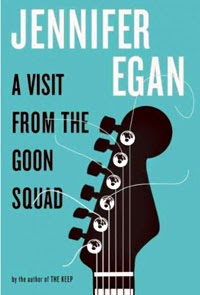Given that THE high-profile literary event this year was Jonathan Franzen's novel "Freedom", it came as a surprise that Franzen was not even cited among the other two finalists (those being "The Privileges" by Jonathan Dee and "The Surrendered" by Chang Rae-lee.)
Now that I know something about Egan's prize-winning novel, I can't wait to read it. From the book's description, it seems to be a complex interconnecting of characters in a story about the music industry, and about Baby Boomers aging in a world of runaway technology. The "goon" in the title is, apparently, the relentless passage of time, from whose visitation none of us escapes. In a terrific book review in The Guardian , critic Justine Jordan remarked as follows:
"Throughout the novel, characters strain to apprehend time and its effects on the flux of personality – that desire, as Sasha puts it, to be able to say "I'm changing I'm changing I'm changing: I've changed!" Egan's chronologically jumbled structure is the perfect vehicle to express this, shuttling the reader between prophecy and hindsight."I was immediately attracted to this, because I would like to think, in some very modest way, I am doing the same thing with this journal.
I re-visit the past (favorite films, personal anecdotes about growing up), write about things I love, share new endeavors, and comment on this obstacle-course of a world. I do this in order to find acceptance, cry foul if justified, and make personal discoveries. I want to entertain my friends, and feed my art....It is sometimes like a river changing its course, sometimes like a butterfly's metamorphosis. "Prophecy and hindsight." Yes!
The idea of "reinventing" one's self: of trying intentionally to effect life changes, of returning to the guideposts of one's history, of losing one's way before suddenly realizing something HAS changed....that is what I have hoped to chronicle on these "pages".
I feel like I am in the very midst of this journey, not only of finding new purpose, while making my current strengths more meaningful, but of continuing to define the meaning of "reinvention".
It is the kind of artistic expression promised by novels such as "A Visit From The Goon Squad" that can help refresh one's efforts, renew one's inspiration, and offer new directions.
Whether I leave a legacy of film reviews or fiction, whether I have an epiphany in another part of the world, whether I find life's meaning among the voiceless creatures around us...that's what I continue to seek, with this Journal as my playground, my laboratory, my stage.
* * * *
A full list of Pulitzer Winners can be found here. Those of you I follow here, and who are kind enough to signal their visits with comments, will one day be on this Pulitzer list....and I hope to join you.
I was happy to see that our own Chicago Sun Times was victorious in the category of Local Reporting, for their series on the devastation that gun violence has on Chicago neighborhoods (Frank Main, Mark Konkol and John J. Kim). The beleaguered Sun-Times needed this recognition, its first Pulitzer since 1989. (Roger Ebert won the Prize for his film criticism in 1975.)
The massive snowstorm in early February almost cost them the award. It was the final day to submit entries, with few forms of transportation running on the treacherous roads, and the journalists were desperate to get their work out on time. Finally, a lone UPS worker who was still at the office scanned the package and the delivery was made on time. The rest is Pulitzer history.






